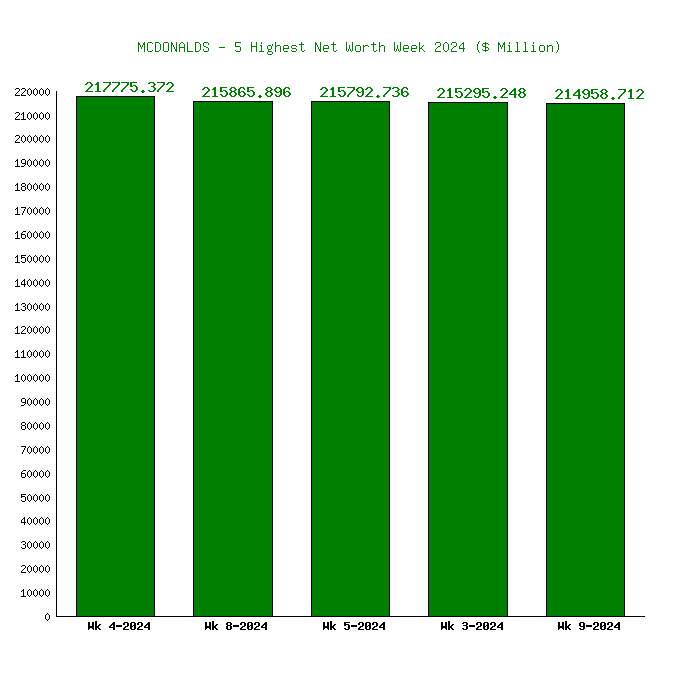The net worth of McDonald's represents the value of the company's assets after subtracting its liabilities. For instance, if McDonald's has assets worth $100 billion and liabilities worth $50 billion, its net worth would be $50 billion.
Understanding the net worth of McDonald's is crucial for investors and financial analysts to assess the company's financial health. It gives insights into the company's ability to meet its obligations, fund operations, and generate returns for shareholders. A historically significant development was the company's shift from a franchise-only model to a more diversified business model, including company-owned restaurants and other ventures.
This article will delve into the key factors influencing McDonald's net worth, analyze its historical trends, and discuss its implications for investors and the broader market.
Net Worth of McDonald's
The net worth of McDonald's, a measure of its financial health, encompasses various essential aspects that provide insights into the company's overall well-being.
- Assets: Properties, equipment, and investments
- Liabilities: Debt obligations and accounts payable
- Equity: Ownership interest in the company
- Revenue: Income generated from operations
- Expenses: Costs incurred in generating revenue
- Profit: Revenue minus expenses
- Cash Flow: Movement of cash into and out of the company
- Debt: Amount owed to creditors
- Return on Investment: Measure of profitability
Understanding these key aspects helps investors, analysts, and other stakeholders assess McDonald's financial performance, make informed decisions, and gauge its long-term prospects. For instance, a company with high assets and low liabilities relative to its peers may be considered financially strong and stable.
Assets
Assets, encompassing properties, equipment, and investments, constitute the foundation of McDonald's financial strength and stability, contributing significantly to its net worth.
- Real estate: McDonald's owns or leases a vast network of restaurants globally, representing a substantial portion of its assets. These properties generate rental income and contribute to the company's long-term value.
- Equipment: The company's kitchens and dining areas are equipped with specialized equipment essential for food preparation and service. These assets enable McDonald's to maintain its operational efficiency and meet customer demand.
- Investments: McDonald's invests in various financial instruments, including stocks, bonds, and real estate, to diversify its portfolio and generate additional income streams.
- Intangible assets: McDonald's brand recognition, trademarks, and intellectual property also contribute to its overall net worth. These intangible assets are crucial for maintaining customer loyalty and driving revenue.
In summary, McDonald's assets, including properties, equipment, investments, and intangible assets, provide the foundation for its financial well-being and long-term growth prospects, ultimately contributing to a higher net worth.
Liabilities
Liabilities, encompassing debt obligations and accounts payable, represent financial responsibilities that McDonald's owes to external parties. They play a crucial role in determining the company's net worth, as they reduce the value of its assets.
Debt obligations, such as loans and bonds, introduce interest expenses and repayment schedules that can impact McDonald's cash flow and profitability. Similarly, accounts payable, representing unpaid bills to suppliers and vendors, must be managed effectively to maintain good relationships and avoid late payment penalties.
Real-life examples of liabilities within McDonald's net worth include long-term debt used to finance restaurant expansions and short-term debt to cover operational expenses. Managing these liabilities prudently is essential for McDonald's financial health, as excessive debt can strain its resources and limit its ability to invest in growth opportunities.
Understanding the connection between liabilities and net worth enables investors and analysts to assess McDonald's financial leverage and risk profile. It also helps management make informed decisions regarding debt financing, capital structure, and overall financial strategy.
Equity
Equity, representing ownership interest in McDonald's, holds a critical position in determining its net worth. It's the residual value after subtracting liabilities from assets. Shareholders, who hold equity in the company, have a claim on its earnings and assets. Consequently, equity directly influences McDonald's net worth and provides insights into the company's financial well-being.
Real-life examples illustrate this relationship. In 2023, McDonald's reported total assets of $41.8 billion and total liabilities of $26.9 billion, resulting in a net worth of $14.9 billion. Simultaneously, the company had $12.1 billion in outstanding common stock, representing its equity. This indicates that shareholders' ownership interest comprises a significant portion of McDonald's net worth.
Understanding the connection between equity and net worth is crucial for investors seeking to evaluate McDonald's financial health. It helps them gauge the company's ability to generate returns, assess its capital structure, and make informed investment decisions. Moreover, it enables McDonald's management to optimize its financial strategy, balancing debt and equity to maximize shareholder value.
Revenue
Revenue, representing income generated from McDonald's core operations, plays a pivotal role in determining the company's net worth. It's the lifeblood of the business, providing the financial foundation for its operations and growth.
- Franchise fees and royalties: As a franchisor, McDonald's receives income from its franchisees in the form of fees and royalties. This revenue stream is directly tied to the expansion and performance of its global franchise network.
- Sales revenue: The vast majority of McDonald's revenue comes from the sale of food and beverages at its restaurants. Factors such as menu offerings, customer traffic, and pricing strategies influence this revenue stream.
- Rent and other income: McDonald's generates additional revenue by leasing its properties to franchisees and other tenants. This income stream provides a steady and reliable source of cash flow.
- Licensing and merchandising: The company also earns revenue from licensing its brand, trademarks, and characters for use in various products and promotions. This revenue stream capitalizes on the strength of the McDonald's brand.
In summary, understanding the components and dynamics of McDonald's revenue is crucial for assessing its net worth. Revenue growth, driven by factors such as franchise expansion, increased sales, and effective marketing campaigns, directly contributes to an increase in the company's net worth. Conversely, a decline in revenue can have a negative impact on its financial health and overall value.
Expenses
Expenses represent the costs incurred by McDonald's in generating revenue and delivering its products and services to customers. Understanding these expenses is crucial for assessing the company's net worth, profitability, and overall financial health.
- Cost of goods sold: This includes the expenses directly related to producing the food and beverages sold by McDonald's, such as raw materials, ingredients, and packaging.
- Labor expenses: These expenses cover the wages and benefits paid to employees, including crew members, managers, and administrative staff.
- Occupancy expenses: These expenses relate to the operation of McDonald's restaurants, including rent, utilities, and maintenance costs.
- Marketing and advertising expenses: These expenses cover the costs of promoting McDonald's brand and menu items through various advertising campaigns and marketing initiatives.
Effective management of expenses is vital for McDonald's financial performance. By optimizing costs while maintaining high-quality standards, the company can increase its profit margins and, subsequently, its net worth. Conversely, rising expenses can put pressure on profitability and impact the company's overall financial health.
Profit
Profit, calculated as revenue minus expenses, holds a central position in the calculation of McDonald's net worth. It represents the financial gain resulting from the company's core operations and directly impacts its overall value. Higher profits lead to an increase in net worth, while lower profits can have the opposite effect.
Real-life examples reinforce this connection. In 2022, McDonald's reported a net income of $6.2 billion on revenue of $23.2 billion. This profit contributed significantly to the company's net worth, which stood at $14.9 billion at the end of the year. Conversely, in 2020, when McDonald's faced challenges due to the COVID-19 pandemic, its net income fell to $4.7 billion, and its net worth declined.
The practical significance of understanding this relationship lies in its implications for investors. Profitability is a key indicator of a company's financial health and long-term prospects. By analyzing McDonald's profit margins and trends, investors can make informed decisions regarding the company's stock and assess the potential return on their investment.
Cash Flow
Cash flow, encompassing the movement of cash into and out of McDonald's, plays a pivotal role in determining the company's net worth. It offers insights into the company's liquidity, financial flexibility, and ability to generate and utilize cash.
- Operating Activities: This facet of cash flow encompasses the cash generated or used in the day-to-day operations of McDonald's. It includes cash received from sales, payments made to suppliers, and expenses incurred in running the restaurants.
- Investing Activities: This facet involves the cash used to acquire or dispose of long-term assets, such as new restaurants, equipment, or investments. It provides insights into McDonald's growth strategy and future expansion plans.
- Financing Activities: This facet includes cash used to raise capital or repay debt. It encompasses activities such as issuing stocks or bonds, paying dividends, and refinancing loans. Understanding financing activities is crucial for assessing McDonald's capital structure and financial leverage.
- Net Change in Cash: This metric represents the overall change in McDonald's cash position during a specific period. It reflects the net effect of the three aforementioned activities and provides a snapshot of the company's cash flow health.
Analyzing cash flow in conjunction with other financial metrics, such as profitability and debt levels, helps investors and analysts gain a comprehensive view of McDonald's financial performance and overall health. By assessing the company's ability to generate and manage cash, they can make informed decisions regarding the company's long-term prospects and investment potential.
Debt
Within the context of "net worth of McDonald's," "Debt: Amount owed to creditors" represents a critical component that exerts a significant influence on the company's overall financial health and stability. Debt encompasses various financial obligations that McDonald's owes to external parties such as banks, bondholders, and suppliers.
- Short-Term Debt: Short-term debt typically has a maturity period of less than one year and is used to meet working capital needs such as inventory purchases and operating expenses.
- Long-Term Debt: Long-term debt has a maturity period of more than one year and is often used to finance capital projects such as new restaurant construction or equipment upgrades.
- Current Portion of Long-Term Debt: This portion of long-term debt is due within the next year and is included in the calculation of current liabilities on the balance sheet.
- Capital Leases: Capital leases are financing arrangements that are treated as debt on the balance sheet and involve the acquisition of assets such as property or equipment.
Understanding the different types and implications of McDonald's debt is crucial for assessing its financial leverage and risk profile. High levels of debt can lead to increased interest expenses, reduced financial flexibility, and potential financial distress if not managed prudently. Conversely, an optimal debt structure can provide access to capital for growth and expansion while minimizing financial risk.
Return on Investment
Within the context of "net worth of McDonald's," "Return on Investment: Measure of profitability" holds a pivotal position as a determinant of the company's overall financial well-being and long-term success. Return on Investment (ROI), a key measure of profitability, quantifies the financial gains or losses resulting from an investment or business venture.
High ROI indicates that McDonald's is efficiently utilizing its resources to generate profits, leading to an increase in its net worth. Conversely, low ROI suggests areas where the company can improve its operations, reduce costs, or optimize its investment strategies to enhance profitability and, subsequently, net worth.
Real-life examples illustrate the connection between ROI and net worth within McDonald's. In 2021, the company reported a strong ROI of 15% on its investment in new restaurant openings, contributing to an overall increase in net worth. By contrast, in 2019, when ROI on advertising campaigns was lower, McDonald's experienced a slight decline in its net worth.
Understanding the relationship between ROI and net worth is crucial for investors, analysts, and business leaders to make informed decisions. By assessing McDonald's ROI performance, they can evaluate the company's financial health, identify potential growth opportunities, and gauge the effectiveness of its strategies. It also enables McDonald's management to optimize resource allocation, prioritize investments, and enhance overall profitability, ultimately driving net worth growth.
In conclusion, this exploration of "net worth of McDonald's" has illuminated the multifaceted nature of the company's financial health. It is evident that various factors, including assets, liabilities, revenue, expenses, cash flow, and debt, play intricate roles in determining the overall value of McDonald's. Understanding the interplay between these elements is crucial for investors, analysts, and stakeholders to make informed decisions.
Two main points that emerge from this analysis are: firstly, profitability, as measured by return on investment, is a significant driver of McDonald's net worth. Secondly, effective management of debt and financial leverage is essential for maintaining long-term financial stability and growth. These points are interconnected, as high profitability enables McDonald's to invest in growth opportunities while managing debt prudently ensures the sustainability of this growth.
As McDonald's continues to navigate the evolving fast-food industry, it will be imperative for the company to maintain a focus on innovation, operational efficiency, and strategic financial planning. By leveraging its strengths and addressing challenges, McDonald's is well-positioned to continue enhancing its net worth and delivering value to shareholders and stakeholders alike.
Unveiling Lee Dong Wook's Father: A Private Life Behind The Spotlight
Redman Health: Empowering Native American Healthcare
MD Vs DO: What's The Difference?

McDonald Net Worth 2023 Assets Revenue PE Ratio

McDonald's Net Worth 2023 Revenues & Profits

McDonalds' (MCD) Net Worth at 193.708 Billion
ncG1vNJzZmiukam%2Fqq2NrJ2oal6Ztqi105qjqJuVlru0vMCcnKxmk6S6cLrErWSwp6KptW67xWaknJyfo66tsNJnn62lnA%3D%3D